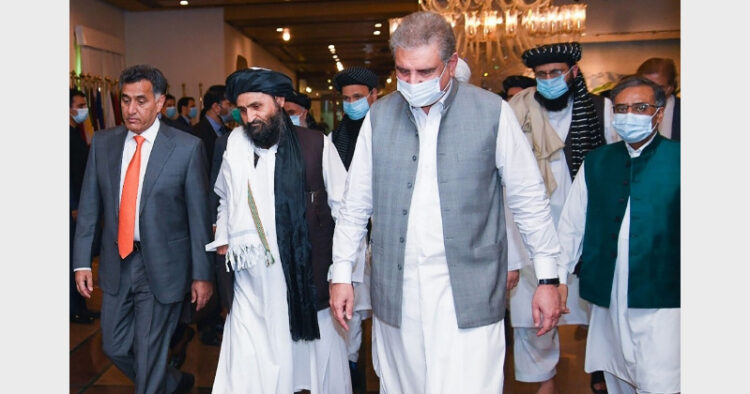New Delhi: Taliban has been expanding its reach in Afghanistan since the US forces have begun withdrawing from the country.
Much has been said and written about the Af-Pak region recently, particularly in the context of the withdrawal of American forces from Afghanistan, which was once a hotbed of terrorism.
In all these comes the role of Pakistan and how it views India’s influence in that country.
MEA spokesperson Arindam Bagchi said on June 24, "India has brought electricity, dams, schools, health clinics, roads, and community projects to Afghanistan. And the world knows what Pakistan has brought to Afghanistan."
Analysts also know that Pakistani Interior Minister Gen (retd) Naseerullah Babar sponsored the Taliban in 1993-94.
One school of thought says the ‘Talibs’ were mostly drawn from Deeni Madaris in Akora Khattal in the Northwest Frontier Province. When the Taliban was created and, a formal announcement made to that effect in 1994, it was taken as a ‘force required’ by Islamabad to ensure a clear route to Central Asia.
There were ample reports also from the US own’s assessment and intelligence inputs that Pakistan’s notorious Inter-Service Intelligence (ISI) and the Taliban were inseparable.
One such report had claimed that the ISI’s vast and highly experienced terrorist support infrastructure was ‘increasingly’ expanding its operations to include the sponsoring of global Islamist terrorism.
And none could ignore the impact either.
One report by security analysts in India a few years back had been very forthcoming.
It said Pakistan always saw the Taliban as an ‘alternative instrumentality’ of young people and Madrasa students.
“The unleashing of a Taliban force backed by the armed skills of the ISI and professional military advisors cut through the disorganized Mujahideen government and could capture Kabul with little resistance.”
There were a few simultaneous and other activities as well.
Organizations such as Jamiat Ulema Pakistan of Maulana Fazlur Rehman were involved in a big way in ‘Islamising’ in radical ways the Afghan refugee children and putting in their minds the ‘dreams’ of the glory of Jihad.
Here we have the crux of the questions on, whether the US move to ‘exit’ was timely, strategic, and prudent.
The successive US administrations including, under Donald Trump, have been looking for ways and means to move out because not only the so-called war against terrorism is never-ending.
It has cost the US about 2 Trillion US dollars and, nearly 2300 American soldiers also had to be ‘martyred’.
Therefore, it is not without reason that experts say the two-decade war has left the US ‘militarily fatigued’ and finally drained.
Of course, an estimated 1,75,000 Afghans died in the gruesome process, with an estimated 52,000 terrorists among them.
Amid these, there are also apprehensions about the ‘trust’ factor vis-à-vis Pakistan in a global war against terrorism.
The US would make a mistake in reposing faith in the Pakistani military and seeking help from air bases there. The logic against these is simple, Islamabad will love to continue to fish in the troubled waters.
The US strategic think tank and the international community must appreciate that Pakistan’s actual intention on terrorism is something unique hovering around double standards.
The proverbial slips between the cup and the lip are still many and, this was proved during the Gen Pervez Musharraf era itself.
After 9/11 and President George W Bush’s assertive stance, one fine evening Gen Musharraf outwardly changed Pakistan’s policy. But that was not out of conviction but was only a tactical ploy.
"Sectarian terrorism has been going on for years. Every one of us is fed up with it. It is becoming unbearable. Our peace-loving people are keen to get rid of the Klashinkov and weapon culture. Everyone is sick of it. It was because of this that we banned Lashkar-e-Jhangvi and Sipah-e-Muhammad," Musharraf had said on Jan 12, 2002.
But on the ground, nothing changed – both under him and subsequent leaders.
Pakistan is thus as guilty as the Taliban or even Al-Qaeda for promoting international terrorism.
Guided by its myopic mindset, Pakistan will again try to walk to Afghanistan for securing ‘strategic depth’ for itself.
Thus it may not be wrong to point out here that ISI’s apparent defeat in its Afghan policy will be sought to be avenged by dividing the Afghans bitterly on ethnic lines.
One curious thing to be observed will be, when Pashtun Taliban in Afghanistan seizes power in Kabul, they can turn the heat on its Pakistani mentors.
Pashtuns could work for integrating Pathan-dominated areas in Pakistan from the Khyber Pakhtunkhwa and Balochistan provinces into Afghanistan.














Comments